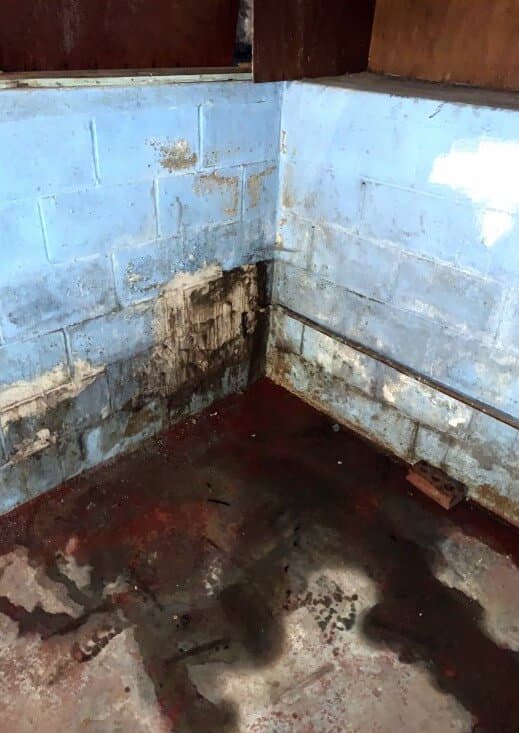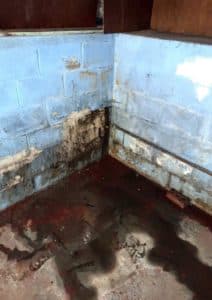
Originally posted 4/9/2018; updated 12/15/22
It can be overwhelming -even panic-inducing- to discover your basement has flooded. You open the door, look down the stairs, and see a soggy, smelly mess. Where do you even start?! My grandmother says the best way to solve a big problem is by taking small steps- it doesn’t matter how small they are, just keep moving forward.
We’re going to take her advice, and break down the recovery process with you. Acculevel is a family-owned and operated company that specializes in foundation repair and waterproofing. We’ve seen a lot of damaged basements, and we know this is a stressful situation for every homeowner.
In this article, we’re going to help you determine the cause of the flooding, what repairs you may need, and how to prevent this situation from happening to you, and your home, again. Along the way, we’ll provide resources to help you learn about your options to best navigate this admittedly unpleasant process.
If your basement flooded because of a burst pipe, you should check with your home insurance about what costs are covered. Flooding from a storm is not usually covered, unless you have added a specific endorsement. This blog outlines the basics, but you will want to closely review your own insurance terms.
It seems obvious, but let’s begin with the water. Has it stopped coming in? If not, where is it coming from? If you have a busted pipe, you’ll need to turn off your water and find an experienced local plumber. Once they’ve repaired the failed components, you can move directly into the cleaning stage.
But let’s say the water is from a major rainstorm that moved through your area. Where did the water originate: through a crack in the wall or floor? Did the drain in the center of your floor back up? Did water come in through a window well?
I’m not saying these things to overwhelm you- just to help you eliminate the potential problems. If you have cracks in your basement wall or floor, you should have these assessed and repaired by a contractor. They could be signs of foundation problems, or an indication that you need a water drainage system. This article describes the three major types of cracks found in basements, and when you need to act.
[box] Do you need to hire a contractor? Please use our free guide, complete with downloadable form: Questions to Ask a Contractor: A Detailed Guide with Checklist.[/box]
If you already have water drainage and a sump pump, this should be checked. Did the sump pump fail? Or could it not keep up? Maybe you lost power- does your sump pump have a battery backup option? In the Midwest, this is something we strongly encourage all homeowners to have; thunderstorms and power outages are virtually inseparable from one another. We have a list of the top sump pumps available to consumers here.
Did the drain in the floor get overwhelmed during the storm, and backflow into your basement? Basement drains are meant for emergency use- like if a pipe bursts or your washing machine overflows. They are not a good substitute for a waterproofing system. We recommend that homeowners have a licensed plumber install a backwater valve, then seal up the drain. A perimeter drainage system with a sump pump is a much more reliable and efficient way to manage any water that gets into your basement.
If the water was pooling around your house, then spilling over into the window wells, we need to review your guttering system. This should be cleaned out at least twice per year, and we recommend that your downspouts be a minimum of ten feet from the home’s foundation. Water draining too close to your house is a standing invitation for water to make itself an unwelcome guest. If you are a DIY fan, this is an excellent project for a handy homeowner. We have an article that further explains the importance of downspout extensions, and tells you how it can be done- complete with video demonstration from one of our own hard-working crew members.
 This photo was taken by an Acculevel project advisor during a routine free estimate.
This photo was taken by an Acculevel project advisor during a routine free estimate.
The water has been drained, repairs are made or scheduled, and the basement space is finally ready for some TLC.
If you had a finished basement, this is going to require a lot of sorting. You’ll need to take down and dispose of drywall, insulation, and any other materials that cannot be salvaged. Some upholstery can be steam-cleaned or dry-cleaned, then made usable again; you’ll need to check the labels on each piece. Electronics are definitely ruined if they have water in them. High quality wood furniture or antiques will need to be treated and restored.
Once you’re down to the bare basement walls, you’ll want to use a good disinfectant cleanser to wipe down the walls and floor. Make certain the cleaning solutions you use are meant for residential use and are for porous surfaces. Do not use bleach to clean concrete; it is porous. Bleach is only a safe and effective cleanser when properly used on non-porous surfaces. Additionally, in small or enclosed spaces the fumes are a breathing hazard for those with allergies or asthma.
If mold has developed by the time you reach bare walls, you should work with a professional who can treat this for you. The Environmental Protection Agency recommends that any mold problem larger than 10 square feet be examined by an expert. In the last twelve months, our customers have paid between $2350-$4700 for mold treatment; we explain how this is done in another article.
Please use our free basement waterproofing guide. It can be read in its entirety, you can select the chapter relevant to you, or bookmark it as a reference when you meet with contractors.
Please find an experienced and knowledgeable foundation company to evaluate your home. We urge you to verify that the company is reputable, insured, and accredited by the Better Business Bureau.
Again, I would urge you to use our guide to questions you should ask a contractor, with a free downloadable form. Every industry has its share of “black sheep;” we don’t want to see any homeowner cheated by a scam artist posing as a legitimate business.
If you live in Indiana or the surrounding states, contact Acculevel. We are a family-owned and operated company, and we provide free written estimates. One of our experienced project advisors will evaluate your basement, then recommend the best course of action for you. Our goal is to help you keep your home strong and healthy for years to come.
[DISPLAY_ULTIMATE_SOCIAL_ICONS]